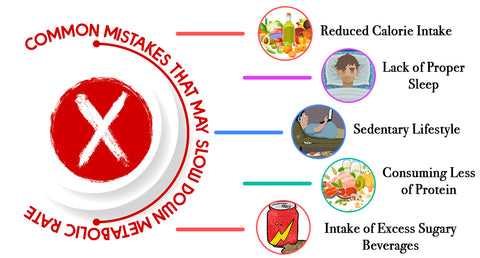When it comes to maintaining or losing weight, we all aim for a high metabolic rate. With ageing, our metabolic rate decreases. Still, there are certain factors or habits which significantly affects our metabolism but we often overlook them. This blog will make you aware of some common lifestyle mistakes that can decrease our metabolic rate.
1. Reduced Calorie Intake - Consuming calories less than the required amount slows down our metabolic rate. Agreed, that to lose weight, we need to create a calorie deficit. If an excess deficit is maintained for a prolonged duration, then it reduces our body’s ability to burn calories. Hence, cutting calories in high amount for longer periods is not advisable. Similarly, eating more than required is equally not suggestible to prevent the metabolic rate from getting reduced.
2. Consuming Less of Protein - Dietary adequacy of proteins is pivotal for maintaining a healthy weight and metabolic rate. Proteins are efficient in boosting metabolic rate more than carbohydrates and fats. A study conducted by Martens EA et al. (2015) concluded that protein-rich diets are effective for weight loss and maintenance. Similarly, another study suggested that to lose or maintain weight, it is advisable to replace refined carbohydrates with a protein-rich diet low in saturated fat. Therefore, the diet should not be a deficit in proteins and good sources of the same should be preferred. This not only prevents muscle loss but also supports muscle-mass maintenance and metabolic rate. High protein intake encourages weight maintenance, post weight loss.
3. Lack of Proper Sleep - A good night sleep is a must for everyone. Prolonged lack of sleep slows down our metabolic rate and increases the risk of numerous ailments. It is observed that while sleeping our metabolic rate reduces by 10-15%. Cortisol and growth hormones are two of the major hormones influencing glucose regulation. Cortisol is a stress hormone reduces during sleep as our brain nerves relax. Researchers have found that just a one-night sleep deprivation can result in an increase in cortisol levels, which further consequences to glucose dysregulation.
4. Sedentary Lifestyle - The association between metabolism and physical inactivity is widely known. Individuals who are engaged in light, moderate or active activities have a lower risk of metabolic disorders like obesity, diabetes, etc. It is said that one additional hour of sedentary activity increases the risk of obesity by 13% and developing abdominal fat by 26%. An active lifestyle helps boost metabolic rate. The data collected for a study conducted in Canada revealed that people who watch television for more than 21 hours per week have an increased prevalence of obesity by approx. 25%. Both physical inactivity and a sedentary lifestyle contribute to the burden of lifestyle-related disorders.
5. Intake of Excess Sugary Beverages - Studies have shown that excess consumption of sugary beverages also slows down our metabolic rate. A high protein diet is recommended but have you ever wondered what happens when it gets combined with a sweet beverage? Studies revealed that drinking sugary beverages along with a protein-rich meal reduces fat use and diet-induced thermogenesis by 40%. This, in turn, leads to the retention of extra calories in our body due to reduced metabolism causing weight gain.
To conclude, these are some common lifestyle practices which most of us follow without realising its aftermath. Say hi to high metabolic rate by avoiding such practices as much as possible.
REFERENCES
- Halton, T.L., & Hu, FB.(2004).The effects of high protein diets on thermogenesis, satiety and weight loss.J Am Coll Nutr.23(5),373-85
- Martens, E.A., Gonnissen, H.K., Gatta-Cherifi, B., Janssens, P.L., & Westerterp-Plantenga, M.S.(2015).Maintenance of energy expenditure on high-protein vs. high-carbohydrate diets at a constant body weight may prevent a positive energy balance.Clin Nutr.34(5),968-75
- Westerterp-Plantenga, M.S., Lejeune, M.P., Nijs, I., van Ooijen, M., & Kovacs, E.M.(2004).High protein intake sustains weight maintenance after body weight loss in humans.Int J Obes Relat Metab Disord.28(1),57-64
- Sharma, S., & Kavuru, M. (2010). Sleep and metabolism: an overview. International journal of endocrinology, 2010, 270832. doi:10.1155/2010/270832
- González, K., Fuentes, J., & Márquez, J. L. (2017). Physical Inactivity, Sedentary Behavior and Chronic Diseases. Korean journal of family medicine, 38(3), 111–115. doi:10.4082/kjfm.2017.38.3.111
- James A. Levine.(2014) Physiology is Medicine Lethal Sitting: Homo Sedentarius Seeks Answers.Retrieved from https://doi.org/10.1152/physiol.00034.2014
- Casperson, Dr. S.(2017).Sugar-sweetened drinks and your metabolism.Retrieved from https://blogs.biomedcentral.com/bmcseriesblog/2017/07/21/sugar-sweetened-drinks-and-your-metabolism/

